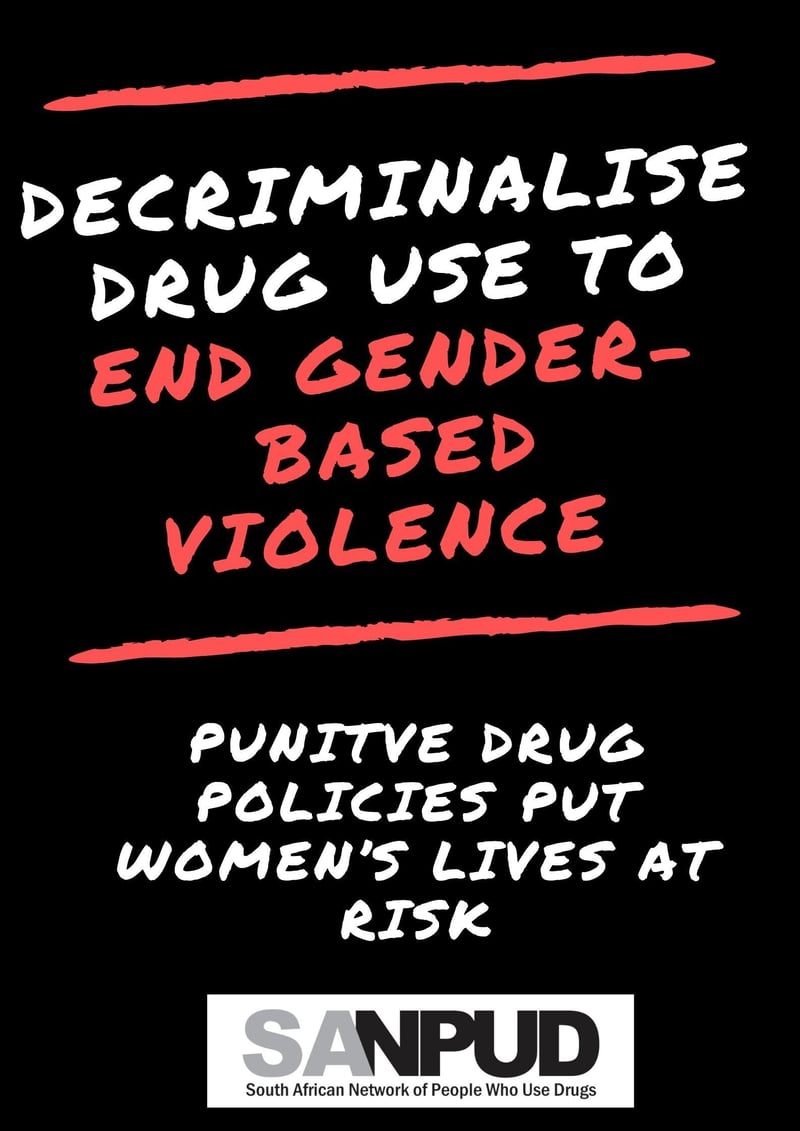Safeguarding Women and Ending Gender-Based Violence - SANPUD's Fight Against the Criminalisation of Drug Use
Written by: Phumlani Malinga Save to Instapaper
The policy of criminalising the use of drugs has far-reaching effects on public health, society, and gender equality. This approach not only punishes those who use drugs but also increases the vulnerabilities faced by women who use drugs, leading to various forms of abuse and social and health problems. To combat this issue, the South African Network of People Who Use Drugs (SANPUD) is advocating for decriminalisation as a crucial step towards empowering marginalised women and ending gender-based violence.
When drug use is treated as a criminal justice issue, women, particularly those who are street-based, encounter systemic discrimination and are often shunned from crucial health and social services. The stigma is aggravated by law enforcement practices involving confiscation of medical supplies and illegal arrests. Women find themselves at the mercy of a prejudiced system where sexual violence and coercion by the police are distressingly common.
Charne Roberts, the National Advocacy and Regional Coordinator at SANPUD recalls some of the human rights violations reported by the women who use drugs: “They are being sexually violated by police when they are caught with drugs. They need to give sexual favours or get arrested and end up suffering from withdrawals. Some even get drugs planted on them, and then they get told, “No one will believe you over an officer of the law.” They end up having to perform oral sex on these officers or end up getting arrested if they refuse. Women are being sexually violated, and when they try to report the case, they end up being asked, “Were you raped or were you just not paid?"
SANPUD maintains that body autonomy is central to women's rights and safety. Decriminalisation represents a pivotal component—not an isolated solution—of a broader strategy to protect and enhance women's rights and agency. Emphasising this, SANPUD argues that only through additional social and legal safeguards can women fully exercise their human and socioeconomic rights.
In its commitment to shifting paradigms, SANPUD actively removes barriers to women's participation in policy design, implementation, and evaluation. For meaningful community engagement, they are building trust through clear communication and actively integrating women's perspectives into policy discussions. This approach is substantiated by SANPUD's collaboration with different community networks in forming networks of women’s organisations that interface with Local Drug Action Committees and the Central Drug Authority, ensuring women who use drugs occupy significant decision-making roles.
Financial backing and support for peer-led organisations dedicated to women who use drugs are crucial. These organisations, as SANPUD underscores, have an acute understanding of the community's needs and are ideally placed to influence policymaking from a grassroots level. SANPUD's role in education and decriminalisation training for community-led organisations exemplifies their multi-pronged approach to advocacy.
Furthermore, through partnerships with the South African Police Service (SAPS), SANPUD is providing dignity diversity training and sensitizing law enforcement officials to treat people who use drugs with respect and empathy. Similar training programmes extend to healthcare workers to improve service delivery to those seeking help.
Campaigns like FemAlive illustrate SANPUD's dedication to advocacy. These platforms are not just demonstrations; they are collective affirmations that women's bodies are not public property and substance choices do not negate women’s human rights. The campaign's synergy with community organisations and even SAPS members creates a potent stand against gender-based violence.
SANPUD recognises that decriminalisation as a strategy that reallocates resources from criminalisation to harm reduction and treatment founded on scientific evidence. This paradigm elevates education and support, nurturing a societal ethos that prioritises the welfare of women who use drugs.
Get new press articles by email
A media specialist for drug policy advocacy networks that work to protect and promote the human rights of people who use drugs.
Latest from
- SANPUD Seeks Strategic Leaders to Join Peer-led Board
- How Criminalisation, Rights Erosion and Regulatory Gaps Fuel Deaths in Unregistered Rehab Centres
- Beyond Condemnation - Poverty, Alcohol and Childhood Substance Exposure in SA
- Peer-Led Action Must Be Central to South Africa’s Hepatitis Response
- Turning Airwaves into Action - Using Radio Interviews to Drive HIV Advocacy
- Nina Manzi Wellness Day taking place at the Bellhaven Harm Reduction Centre in Greyville
- SANPUD Ensures Voices of People Who Use Drugs (PWUD) Shape Drug Policy, Sustainable Funding and Research
- Funding Disruption for HIV and Harm Reduction Services Will Cost Lives So South Africa Must Rethink Our Priorities
- Empowering Nurses for Compassionate Care - Join the Online Workshop on the Pregnancy and Substance Use Toolkit
- Meaningful engagement between funders and beneficiaries charts a real path to progress
- SANPUD hosts Groundbreaking Interpol Training on GBV and Harm Reduction
- SANPUD's Advocacy for Inclusive Open Clinics Through Community-Led Monitoring
- Community-Led Monitoring Leads to Empilisweni Clinic's Inaugural PWUD Open Day
- Public Event Promoting Healthcare Services Integration at local level to increase coverage of people from marginalised populations
- The Importance of Informed Decision-Makers in Harm Reduction
The Pulse Latest Articles
- Opinion Piece: Activating Leadership To Engage The Passive Workforce (February 11, 2026)
- Tchagra Trail Wilderness Consulting Launches A New Safari Experience In Photography And Tracking (February 9, 2026)
- Magic: The Gathering Releases Lorwyn Eclipsed (February 6, 2026)
- Back To Work, Back To Balance: Rethinking The 3pm Slump (February 5, 2026)
- Back-to-school Lunchboxes That Just Make Sense (February 5, 2026)
